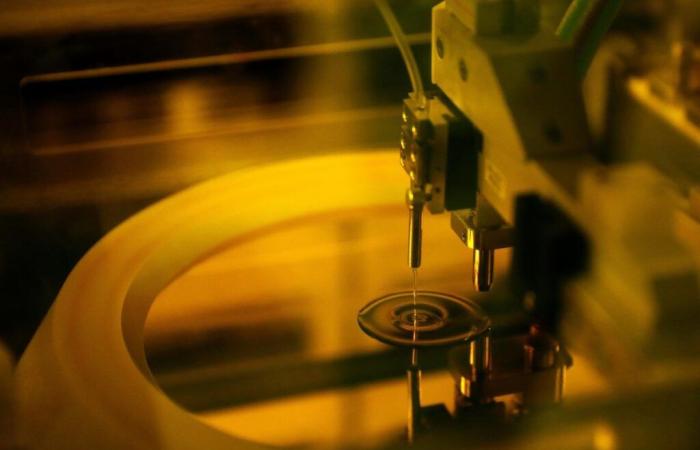Technology –
Washington tightens controls on AI chip exports
The Biden government seeks to prevent foreign countries, particularly China, from having access to the latest innovations in AI.
Published today at 1:15 a.m.
Washington wants to impose new authorizations to be obtained for exports and transfers of sophisticated computer chips.
AFP
Subscribe now and enjoy the audio playback feature.
BotTalk
Joe Biden’s government presented new rules on Monday on the export of artificial intelligence (AI) technologies to prevent its adversaries from having access to the latest innovations, a decision criticized by China and American manufacturers.
“The United States today leads the world in AI, whether it is the development of AI or the design of specialized AI chips, and it is essential that it remain,” declared Gina Raimondo, Minister of Commerce, during a press briefing.
In October 2023, it unveiled restrictions on the export of the most efficient chips to China, in particular components used for AI, in order to prevent their use by Beijing for military purposes.
Critics of Beijing
Washington wants to impose new authorizations to be obtained for exports and transfers of sophisticated computer chips, in an expanded list of countries, and strengthen controls on the dissemination of the parameters of the most sophisticated generative AI models.
And AI data centers, which contain the computer servers needed to run the most advanced models, will have to meet enhanced security conditions to import cutting-edge components.
The Chinese Ministry of Commerce on Monday castigated the “generalization of the concept of national security” and denounced these new rules as a “flagrant violation” of international trade rules. The new regulation will only come into force in 120 days, “to give the new administration time” to make changes if it wishes, said Gina Raimondo.
“Government interference”
Donald Trump, who will be inaugurated on January 20, put strong pressure on China with high customs tariffs during his first term. This time he arrives at the helm with the stated support of leaders from Silicon Valley, keen to be able to export their technologies.
The announced measures could cause “lasting damage to the US economy and global competitiveness” by ceding key markets to rivals, John Neuffer, the director of an association representing the semiconductor industry, said on Monday.
Nvidia, for its part, asserts that “these rules will do nothing to strengthen the security of the United States.” According to the California-based company that rules cutting-edge chips, the first Trump administration showed that the country “wins through innovation, competition and sharing their technologies with the world, not by hiding behind a wall of government interference.
The European Commission also said it was “concerned”, believing that it is “in the interest” of the United States “that the EU buys advanced AI chips from it without any restrictions”.
“Nuclear simulation”
The new rules are supposed to “make it more difficult for our competitors, who use smuggling and remote connections to evade our export controls,” said Jake Sullivan, national security adviser.
But they must also facilitate trade in American technologies and the country’s influence in AI, thanks to exemptions for allied countries, particularly when it comes to limited volumes, meeting the needs of universities and small businesses, for example. .
Since the success of ChatGPT in late 2022, Google, Microsoft and other companies have been racing toward ever-better generative AI models that can compete with humans on many cognitive tasks.
OpenAI, the creator of ChatGPT, released an action plan “for AI in America” on Monday, where the company calls for the possibility of sharing the cutting-edge models with the country’s allies while limiting their export to adversaries “who are more likely to misuse the technology or co-opt the intellectual property.”
“Dual-use technology”
“It’s a dual-use technology,” said Gina Raimondo. “It has many commercial applications, but it can also be used by our adversaries to carry out nuclear simulations, develop biological weapons and improve the army.”
“Every minute counts, from our point of view,” insisted a senior government official, noting that models developed in the United States are only between six and 18 months ahead of Chinese equivalents. He was concerned about the risk that China would build up stocks of computer equipment if the application of the new rules was delayed.
“Around 2018, Huawei was supposed to be subject to new export controls, but there were delays, and Huawei stockpiled enough chips for telecommunications stations for years,” he recalled. “We want to prevent a situation like this from happening again.”
“Latest news”
Want to stay on top of the news? “Tribune de Genève” offers you two meetings per day, directly in your email box. So you don’t miss anything that’s happening in your canton, in Switzerland or around the world.
Other newsletters
Log in
AFP
Did you find an error? Please report it to us.
0 comments






